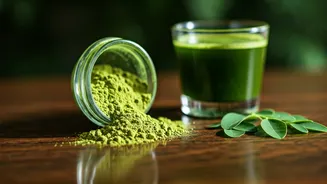Moringa: A Superstar
Moringa oleifera, frequently called the 'miracle tree,' has gained recognition for its impressive nutritional profile and potential health benefits. It
is a rich source of vitamins, minerals, and antioxidants, including vitamin A, vitamin C, calcium, potassium, and iron. These nutrients play crucial roles in maintaining overall health and well-being. The leaves, seeds, and pods of the moringa tree are all edible and utilized in various ways. Traditionally, moringa has been used in Ayurvedic medicine for its various medicinal properties, like in treating a wide range of ailments, from skin conditions to digestive problems. The tree is native to the Indian subcontinent and is now cultivated in many tropical and subtropical regions. The versatility and nutritional value of moringa make it an excellent addition to a health-conscious lifestyle. It's easy to add moringa to your diet through its powder or juice form.
Moringa for Hair
The remarkable advantages of moringa extend to hair health, making it a valuable addition to your hair care regimen. Moringa is filled with vitamins and minerals that promote hair growth, strength, and overall vitality. Vitamin A supports the production of sebum, which keeps the scalp moisturized and promotes healthy hair. Vitamin C acts as an antioxidant, protecting hair from damage and enhancing collagen production, which is essential for hair strength. Moringa can help reduce hair fall, encourage faster growth, and improve the hair's overall texture. The presence of zinc in moringa also contributes to hair repair and growth. Using moringa-infused hair oils, masks, or consuming moringa internally can provide these benefits, contributing to vibrant, strong hair.
Powder vs. Juice
When deciding how to consume moringa, you have two primary options: moringa powder and moringa juice. Moringa powder is made by drying the leaves and grinding them into a fine powder. This form is versatile and easy to incorporate into your diet. You can add it to smoothies, juices, teas, or sprinkle it on your food. Moringa juice is the fresh extract from the moringa leaves, offering a more concentrated dose of nutrients. The choice between the two depends on your preference and lifestyle. Powder is convenient for daily use, while juice might offer a more potent nutrient boost. Considering the nutritional content and ease of use, you can choose the best option.
How to Consume
Incorporating moringa into your daily routine is easy. For moringa powder, start with a small amount, such as a teaspoon, and gradually increase the dosage as your body adjusts. It can be added to various dishes such as smoothies, soups, or even baked goods. Moringa juice can be consumed on its own or mixed with other fruit or vegetable juices for added flavor. For hair care, moringa powder can be made into a hair mask by mixing it with water or other natural ingredients like yogurt or honey. Apply the mask to your hair and scalp, allowing it to sit for about 30 minutes before rinsing. Regular consumption and topical use of moringa can contribute to overall health and hair vitality. It’s crucial to listen to your body and adjust the intake to suit your individual needs.
Side Effects & Safety
While moringa is generally safe, it's essential to be aware of potential side effects and precautions. Some individuals may experience mild digestive issues, such as bloating or stomach upset, especially when starting to consume moringa. It is essential to start with a small amount and gradually increase the dosage to allow your body to adjust. Pregnant or breastfeeding women should consult with a healthcare professional before using moringa. If you are taking any medications, it's advisable to check for any potential interactions. Overall, moringa is considered safe for most people when consumed in moderation. Being informed on potential side effects is essential to safely and effectively incorporate this superfood into your lifestyle.
Who Should Avoid
While moringa offers numerous benefits, certain individuals should exercise caution or avoid its consumption. People taking medication should consult their doctors before incorporating moringa into their diet. As moringa can lower blood sugar levels, individuals with diabetes should monitor their blood sugar levels carefully. Those with thyroid issues should consult their healthcare provider before using moringa, as it could affect thyroid hormone production. It is important to know your body and any pre-existing health conditions that might interfere. Consulting a healthcare professional is crucial to determine if moringa is right for you, ensuring safe and effective use based on your individual health needs.
















